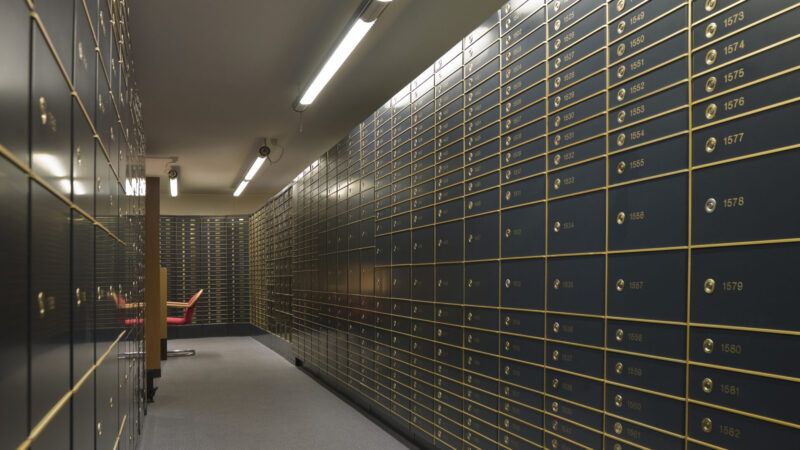Federal Agents Had No Authority To Seize Contents of Safe Deposit Boxes, Newly Unsealed Warrant Confirms
The warrant affidavit made generalized accusations against U.S. Private Vaults' customers but provided no evidence of criminal wrongdoing by individuals whose assets have been seized.

Before federal agents applied for a warrant to raid a Beverly Hills safe deposit box storage business in March, they used undercover agents and informants to build a lengthy criminal case against the business's co-owners.
What they didn't do, however, was provide evidence of wrongdoing by the dozens of U.S. Private Vaults customers who had their valuable property seized in the raid. Instead, the affidavit submitted to the warrant-issuing magistrate judge, obtained and reviewed by Reason, relied on sweeping generalizations about the business's customer base. Importantly, the FBI also did not tell the magistrate that they planned to forfeit property taken from the safe deposit boxes stored at U.S. Private Vaults, or to use the contents for investigative purposes.
As Reason has previously reported, the warrant that authorized the March 22 raid explicitly forbade the FBI from seizing the safe deposit boxes or their contents. The newly unsealed affidavit that outlined the legal rationale for the raid confirms that U.S. Private Vaults and its owners—some of whom have extensive criminal histories—were the sole targets, officially, of the investigation. In applying for the warrant, Special Agent Lynne Zellhart told Magistrate Judge Steve Kim that the FBI would only seize illicit drugs, guns, and property belonging to U.S. Private Vaults.
"This warrant does not authorize a criminal search or seizure of the contents of the safety deposit boxes," Zellhart wrote. "Agents shall inspect the contents of the boxes in an effort to identify their owners in order to notify them so that they can claim their property."
That's not what happened. In the months following the raid, federal prosecutors attempted to forfeit more than $85 million in cash and untold amounts of valuables and jewelry from those same boxes. In one court filing, federal prosecutors said they intended to hold the seized property "until such time as plaintiff identifies himself so that the government can offer additional facts pertaining to matters such as whether plaintiff has a drug history…and any other information pertaining to the issue of whether the funds are subject to forfeiture."
In other words, prosecutors are now using the seized contents of the safe deposit boxes to launch additional investigations of individuals who were not subject to the original warrant—and doing it by ignoring the original warrant's prohibition on seizing the contents of the boxes in the first place.
From the perspective of today, the 120-page warrant affidavit filed on March 17 does seem to provide some insight into the FBI's motivations. The document repeatedly outlines, in broad strokes without specific allegations against any person or group of people, allegations against all of U.S. Private Vaults' clients.
"There is no reason for non-criminal clients to use USPV," part of the document reads. "Legitimate customers need not pay to store cash, but can receive interest and insurance by depositing it in a money market or other financial account."
Later: "Only those who wish to hide their wealth from the DEA, IRS, or creditors would instead choose to pay to store actual cash at a single storefront operation owned by the likes of [U.S. Private Vaults' co-owners]."
That's obviously hyperbole. In the months since the raid, Reason and other outlets have reported on several of U.S. Private Vaults' customers who used those safe deposit boxes to store family heirlooms, valuable coins, retirement savings, and other (completely legal) property like flight logs and marriage certificates. Sure, it might make more sense to take advantage of the banking system in many circumstances, but an individual's choice to forego an interest-earning account isn't evidence of criminal intent. Not even close.
Indeed, in another section of the affidavit, the FBI admits that "private safe deposit boxes are not in and of themselves illegal or suspicious."
The affidavit also alleges repeated criminal behavior on the part of U.S. Private Vaults' several co-owners. In conversations with undercover agents and informants that took place over several years, the FBI built a lengthy case against the business's owners. "Separate and unrelated investigations into drug trafficking, human trafficking, illegal gambling, racketeering, computer intrusion, insurance fraud, and identity theft led investigators to the doorstep of USPV. Search warrants executed on individual boxes within USPV consistently produced criminal proceeds and evidence of criminal conduct."
But just like criminal activity in one apartment within a building—or criminal allegations against the property management company—would not justify an FBI raid that seizes all the belongings from every other unit, nothing in the FBI's allegations against U.S. Private Vaults seems to justify such a brazen, sweeping raid.
Repeatedly, a federal judge has blocked prosecutors' attempts to forfeit property from U.S. Private Vaults' customers on such thin, circumstantial evidence. In a June ruling, Judge R. Gary Klausner said law enforcement had provided "no factual basis" for the seizures. Last month, in an order rejecting prosecutors' attempt to get a lawsuit seeking the return of some property dismissed, Klausner wrote that the government's case was not based on "anything more than pure conjecture."
The legal filings that justified the raid seem to confirm as much.


Show Comments (44)